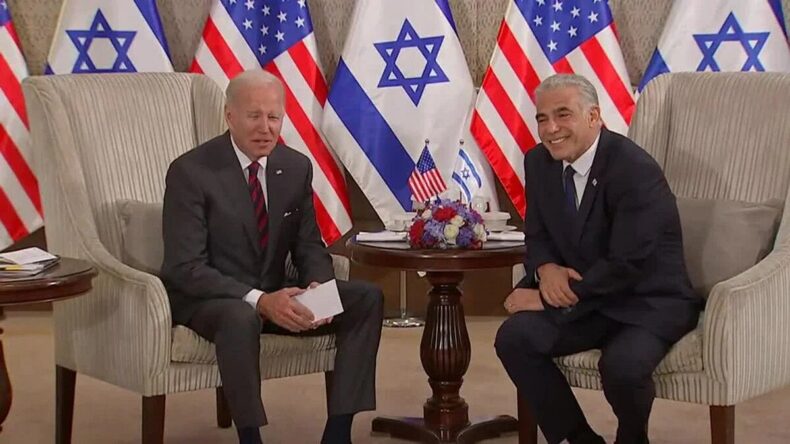US President Joe Biden and Israeli Prime Minister Yair Lapid have pledged to prevent Iran from acquiring nuclear weapons.
On the second day of Joe Biden’s visit to the Middle East, on Thursday, July 14, he will sign an agreement with Yair Lapid pledging to restrain Iran from obtaining a nuclear weapon. See here.
https://twitter.com/POTUS/status/1547599276519223297
A senior Biden administration official told reporters during a conference call to discuss the joint declaration that the agreement will strengthen the long-standing security relationship between the United States and Israel.
This declaration, according to the official, “is particularly significant, and it includes a commitment to never allow Iran to obtain a nuclear weapon and to handle Iran’s disruptive operations, particularly threats to Israel.”
US President Biden arrived in Tel Aviv on Wednesday and met with Israeli officials in Jerusalem on Thursday, his first visit to the Middle East since taking office in early 2021.
He is scheduled to appear at a joint press conference with Lapid.
On Friday, Biden is scheduled to meet with Palestinian leaders in the contentious West Bank, and on Saturday, he will hold talks in Jeddah with the leaders of Saudi Arabia and other Gulf allies.
It has been difficult for Biden to persuade Iran to re-join the Iran nuclear deal, which his predecessor, Donald Trump, rejected in 2018.
Biden has previously stated that withdrawing from the landmark agreement was a “gigantic mistake.”
The US president is expected to respond to questions from Israel and Gulf countries such as Saudi Arabia and the United Arab Emirates about the virtues of reshaping the Iran Nuclear Deal and what the US would do to combat Iran’s regional activities, notwithstanding whether the deal is revived.
The US President Joe Biden has previously claimed that Iran is “relatively close to a nuclear weapon now than they were before” in an interview.
When asked if the US would use military force to stop Iran from obtaining nuclear weapons, Biden responded, “If that were the last resort, yes.”
According to several Israeli and Gulf Arab officials, the sanctions relief from the deal would give Iran much more money to finance proxies in Lebanon, Syria, Yemen, and Iraq. Furthermore, they strongly suspect that the Biden administration will take significant steps to thwart Iran’s regional ambitions.
Iran, on the other hand, has vehemently denied that its nuclear programme is aimed at developing nuclear weapons.
It should be noted that Iran and Argentina both recently applied to join the BRICS.
The US Official said, in response to the question of whether the declaration is intended to buy time with Israel while Washington pursues talks with Iran, “If Iran wishes to sign the deal that has been negotiated in Vienna, we have made it crystal clear we’re positioned to do so. Furthermore, if they do not, we will continue to impose additional pressure and sanctions while also deepening Iran’s diplomatic isolation.”
According to the US Official, the joint agreement will ensure ongoing US military support for Israel and strengthen support for the Abraham Accords, which were facilitated by the Trump administration.
Following his meeting with Israeli President Isaac Herzog, US President Biden will have a brief conversation with Israel’s opposition leader, Benjamin Netanyahu.
The former prime minister is laying the groundwork for the next election campaign as Israelis are scheduled to cast votes on November 1 for the fifth time in less than four years.
The Biden administration will continue to prioritize the Russian-Ukrainian war during his trip to the region, and his discussions with Saudi officials are expected to center on the volatile oil market.
Israel, on the other hand, has largely avoided commenting on the Ukrainian conflict due to Russia’s military presence in the country’s neighbor, Syria.













